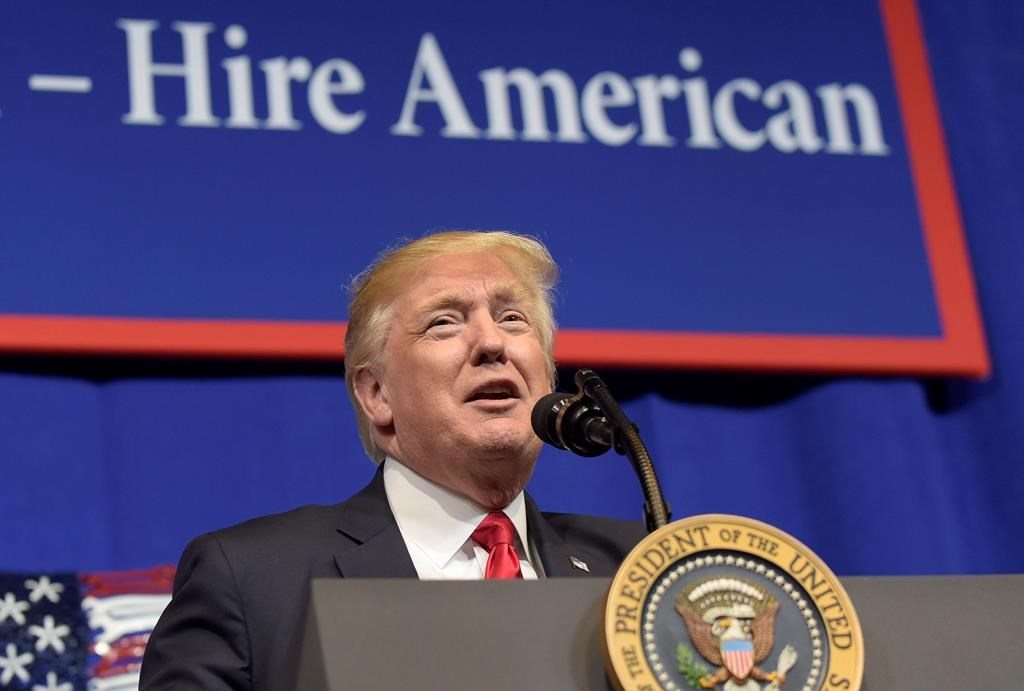Support strong Canadian climate journalism for 2025
In a private meeting inside the White House, the president of the United States groaned about Canadian dairy practices to a visiting Prime Minister Justin Trudeau, lamenting that regulatory changes were hurting U.S. exporters.
The president doing the grousing was Barack Obama.
While Donald Trump's complaint about Canadian milk this week may have been brasher, louder, and certainly more public, it carried a familiar ring to the circle of people who sat in on Trudeau meetings with Obama.
Repeat interventions on this issue from two decidedly different presidents make clear this irritant isn't new; it isn't going away easily; and it's liable to become part of a broader dispute about dairy in upcoming NAFTA negotiations.
This wasn't reported at the time, but Canada's diafiltered milk regulations were a rare discordant note at the so-called Bromance Summit, on that sunny spring morning in early 2016 when Trudeau arrived for his first Oval Office meeting.
Sources say Obama emphasized it there — and again during his final visit to Ottawa. Once again it was done quietly, easily drowned out by the boisterous reception bestowed upon the president by Canadian parliamentarians.
"The Trump White House is indistinguishable from the Obama White House on dairy," said one Canadian official.
"(Obama) spent a lot of time on it in D.C. and again in Ottawa. . . . They are (now) very much taking the Obama line."
Obama's former ambassador to Canada recalls those conversations.
In an interview, Bruce Heyman explained the powerful U.S. domestic politics of this issue. It so happens the top lawmakers from each party come from a dairy-producing state: New York's Chuck Schumer, the Democrats' leader in the Senate, and Wisconsin's Paul Ryan, the Republican House Speaker.
Schumer urged Heyman to press the matter.
"This is not something new," Heyman said. "And it's not one party. It is not a Republican party, or a Democratic party, issue. It is an issue that is longstanding."
It was no accident Trump went after the northern neighbour when he was in Wisconsin — home to Ryan, and Gov. Scott Walker, who co-authored a letter on dairy to the president with his Democratic peer from New York.
"In Canada, some very unfair things have happened to our dairy farmers," Trump said. "It's another typical one-sided deal against the United States and it's not going to be happening for long. . . . We're going to call Canada and we're going to say, 'What happened?' . . . We're going to get the solution, not just the answer."
The basic source of this irritant is a major shift in consumer tastes.
In short, natural fats are back in style, replaced by sugar as the human-health bogeyman. According to Canada's federal Dairy Information Centre, American demand for butter increased nearly 20 per cent per capita from 2010 to 2015.
"You used to draw the curtains if you ate butter. (The attitude used to be): 'You're not eating butter, are you?'" said Michael Von Massow, a food economist at the University of Guelph.
"Now butter is cool. Everyone says it's healthy. . . . Butter is back."
But that causes a problem, Von Massow says: What to do with all the liquid left over from butter processing? Producers have responded with innovative new dairy drinks and cheeses based on those ingredients.
And those ingredients were increasingly making their way into Canada, bypassing the tight controls on traditional dairy products. Canadian farmers insisted their policy-makers fight back — and they did.
Dairy components were reclassified, allowing these ingredients to be sold at market rates cheaper than the prices for milk under Canada's supply-management controls. To the U.S. government, this is cited as a major irritant with Canada in its annual report on foreign trade barriers.
One trade lawyer says Canadian dairy producers may regret these recent moves. This irritant over diafiltered milk is bound to turn into a broader conversation in NAFTA about Canada's supply-management controls in general, Mark Warner says.
"(This) is like waving a red flag in front of the bull," said the Canadian-American trade lawyer.
Von Massow agrees the upcoming NAFTA negotiations will see a broader tussle over dairy.
It's already happened in recent trade deals.
Canada's import controls were pried open slightly, first in an agreement with Europe and then with the Trans-Pacific Partnership. The Obama trade czar who led the TPP effort, Michael Froman, has said that because Trump slammed that deal as too weak, and essentially killed it, he expects the new president might seek to get even more U.S. dairy exports into Canada.
Heyman's advice to Canadians: Don't get too exercised over the day-to-day drama.
That includes presidential scoldings from Wisconsin.
Heyman said negotiations tend to start with tough language, and wind up with a more mutually beneficial compromise, although he said his own preference is to handle these differences quietly, behind closed doors.
"You can't let yourself get worked up over every twist and turn," he said.




Comments